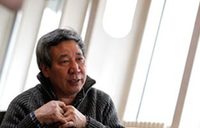Oral traditions now accessible with a click
Updated: 2014-03-11 10:18
By Han Bingbin (China Daily)
|
||||||||
A key value of passing down a culture by word of mouth is that it takes on so many different forms in the process, reflecting changes in people's mentality and social reality.
Now an online database, the result of the Chinese Folk Artists Association's Chinese Oral Literature Digitalization Project, gives fans of Chinese traditional culture a chance to observe the evolution.
|
 |
Type in the name of a folk legend, for example, and all related versions will pop up for your reference. Users can do this with 11 genres of oral literature, including myths, riddles and folk songs.
In the 1950s, 1980s and early 2000s, the association organized three massive searches for Chinese oral literature nationwide.
More than 2 million professionals - many of them veteran librarians and scholars who have devoted most of their life observing and recording the country's disappearing traditions - have been sent to more than 2,800 counties to seek out the hidden gems of China's rich folk culture.
In addition to an exciting number of folk tales, folk music and proverbs, the records also include the backgrounds of the narrators, the people recording the story and information about how the content was found and recorded. It is a pity that most of these rare materials did not have a chance to be published.
Feng Jicai, one of the best-known Chinese writers and now chairman of the folk artists association, has dedicated years to discovering and preserving the country's folk culture. In 2010, to make its collections accessible to the general public, Feng initiated the Chinese Oral Literature Digitalization Project.
All the written materials are uploaded on an online database, where they are carefully categorized by region, subject matter and so on to be easily accessible by the public.
Now home to 4,905 books of oral literature records, comprising more than 800 million words, the database will serve as a free library for anyone interested in exploring China's literary heritage.
Feng says the database is like a modern counterpart of Siku Quanshu (Emperor's Four Treasuries), a complete library in four branches of literature which Qing Dynasty's Qianlong Emperor commissioned to demonstrate that Qing could surpass the Ming Dynasty's 1403 Yongle Encyclopedia - China's largest encyclopedia at the time.
"These stories of Chinese people's moral principles and values have been passed down through generations," Feng says.
"I hope one day these materials can also meet the public in hard copies, bringing China's 5,000-year-old intangible oral literature to the hall of Chinese civilization."

 Gorgeous Liu Tao poses for COSMO magazine
Gorgeous Liu Tao poses for COSMO magazine
 Post-baby Duchess
Post-baby Duchess
 Victoria Beckham S/S 2014 presented during NYFW
Victoria Beckham S/S 2014 presented during NYFW
 'Despicable' minions upset Depp's 'Lone Ranger' at box office
'Despicable' minions upset Depp's 'Lone Ranger' at box office
 'Taken 2' grabs movie box office crown
'Taken 2' grabs movie box office crown
 Rihanna's 'Diamonds' tops UK pop chart
Rihanna's 'Diamonds' tops UK pop chart
 Fans get look at vintage Rolling Stones
Fans get look at vintage Rolling Stones
 Celebrities attend Power of Women event
Celebrities attend Power of Women event
Most Viewed
Editor's Picks

|

|

|

|

|

|
Today's Top News
Search widens for lost air carrier Boeing 777
Carrying out goals of report vital
GDP target of 7.5% possible
ZTE, Houston Rockets join hands
Missing jet may have disintegrated - source
Affirmative action and US courts
Tougher penalty for underage prostitutes
ROM opens gates of China's Forbidden City
US Weekly

|

|








